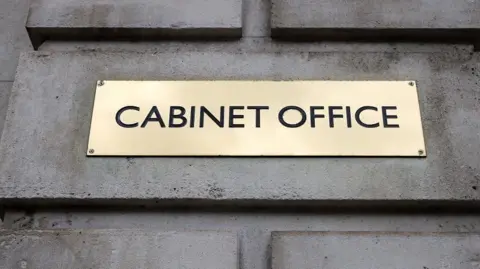In a recent development that raises eyebrows about transparency in government, it has been revealed that the UK’s Cabinet Office incurred expenses exceeding £30,000 attempting to prevent the publication of a questionnaire designed for ministers to declare their financial interests. This investigation was initially prompted by the dismissal of Nadhim Zahawi, the former chairman of the Conservative Party, who was sacked for violating the ministerial code. Zahawi’s case became public knowledge after a Freedom of Information request was filed by BBC News in January 2023, following concerns regarding his tax declarations.
Zahawi failed to disclose ongoing tax investigations when he was appointed Chancellor in July 2022. The Independent Adviser on Ministers’ Interests noted this breach, underlining the importance of ministers declaring their financial affairs transparently. The specific ministerial declaration form that Zahawi was required to complete featured clear prompts regarding tax affairs and inquiries by HM Revenue and Customs (HMRC).
Despite this, Rishi Sunak’s administration resisted the release of the document to the BBC, advocating that ministers ought to feel assured of consistent confidentiality throughout the declaration process. However, the Information Commissioner’s Office (ICO) ruled in September 2023 that the document should be disclosed, emphasizing public interest over confidentiality.
As the situation unfolded, the Cabinet Office took further measures to contest the ICO’s ruling by appealing to the Information Rights Tribunal. Remarkably, in February 2024, the tribunal upheld the ICO’s recommendation, reinforcing the need for transparency in governmental operations. The legal battle perpetuated by the government against its own information watchdog ultimately cost taxpayers a hefty total of £32,251.
Transparency International UK’s senior research officer, Rose Whiffen, spoke out on the matter, asserting that the disclosure of ministers’ financial interests is fundamental for accountability. She indicated that such transparency allows the public to understand how personal financial interests may influence governmental decision-making. Whiffen further criticized the government’s approach suggesting that transparency should be the default position rather than engaging in costly legal battles to preserve unnecessary secrecy.
The questionnaire that Zahawi filled out when he became Chancellor included critical questions such as, “Are your tax affairs up to date?” and, “Are you, or have you ever been in dispute with, or under investigation by, HM Revenue and Customs?” Such questions served as an essential reminder for ministers that their financial activities must not be dubious or perceived as tax avoidance schemes. Zahawi allegedly paid a significant penalty to HMRC, characterizing his tax issues as “careless and not deliberate.”
The form included clauses reminding ministers of the significance of declaring properties accurately and warning them against any discrepancies that could lead to potential scandals. Historical context came into play here as the 2009 expenses scandal had highlighted how some Members of Parliament (MPs) manipulated declarations regarding their primary residences to evade taxes.
The version of the financial interests form that BBC News accessed dates back to July 2022 when the Conservative Party held the reins of power. Following this, the Cabinet Office has denied a separate request from the BBC for access to the current form in use, raising more questions about the government’s commitment to transparency. A spokesperson from the government asserted, “The government is fully committed to transparency,” outlining their efforts to proactively release information beyond the scope of the Freedom of Information Act, claiming to publish thousands of documents each year.
In conclusion, the sequence of events surrounding the attempts to hide the questionnaire reflecting ministers’ financial interests illustrates a significant conflict between governmental transparency and recently revealed confidentiality practices. The overarching public interest remains clear: the availability of such financial declarations is crucial for the accountability of those in power. A proactive attitude towards transparency in government dealings is imperative for maintaining public trust.











